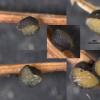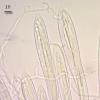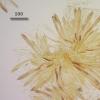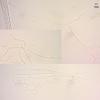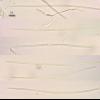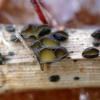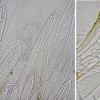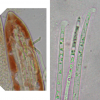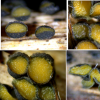
02-02-2026 21:46
Margot en Geert VullingsOn a barkless poplar branch, we found hairy discs

02-02-2026 14:55
 Andgelo Mombert
Andgelo Mombert
Bonjour,Sur thalle de Lobaria pulmonaria.Conidiome

02-02-2026 14:33
 Andgelo Mombert
Andgelo Mombert
Bonjour,Sur le thalle de Peltigera praetextata, ne

31-01-2026 10:22
 Michel Hairaud
Michel Hairaud
Bonjour, Cette hypocreale parasite en nombre les

02-02-2026 09:29
 Bernard CLESSE
Bernard CLESSE
Bonjour à toutes et tous,Pour cette récolte de 2

01-02-2026 19:29
 Nicolas Suberbielle
Nicolas Suberbielle
Bonjour, Marie-Rose D'Angelo (Société Mycologiq

31-01-2026 09:17
 Marc Detollenaere
Marc Detollenaere
Dear Forum,On decorticated wood of Castanea,I foun

29-08-2025 05:16
 Francois Guay
Francois Guay
I think I may have found the teleomorph of Dendros

30-01-2026 21:20
Arnold BüschlenBryocentria brongniartii und B. metzgeriae mit ihr
This interesting species has showed up at Eriophorum vaginatum leaves in autumn, though i was collecting immature structures in summer, but they were not ready then. Finally after the first frosts it was found with fully developed structures. Hysterothecia densely cover very soft dead leaves laying at sphagnum surface.
The structures fit well with description in Johnston and Scheuer ("Lophodermium eriophori comb. nov." Mycotaxon 87 (2003): 489-492.).
Hysterothecia first pustulate, then outer layer bursting longitudinally or radially, enlarge to become turbinate, ellipsoid or more often circular in outline, hymenium yellow to orangish, outer surface black, to 1.5 mm by long axis, 0.5 mm high.
Asci clavate, with crozier, conical tip, inamyloid, 250 x 20 mk; paraphyses branched in upper part (tree-like), end branches circinate, 2.5–3 mk broad at upper part; spores needle-shaped, with loose sheath, with appendix at obtuse end, 150 (132–173) x 3.3 (2.9–3.9) (n=10).?

As you probably noticed in myco litterature, this species has very rarely been collected.
Brigitte Capoen and I luckily found it last year on October 4 in the main peat bog of SAnta Maria in the Somiedo paradise, (Spain, Asturias,)
Here it was Eriophorum angustifolium
I hereby join images I showed in my presenttaion at the Somiedo Ascomycota 2013 congress in last June.
The main features of your collection do suit ours.
Amitiés
Michel
that is interesting. I will look at other substrates, Er. russeolum as well, but untill now it was only at Er. vaginatum here. Could be abundant occasionally.
Nina.

